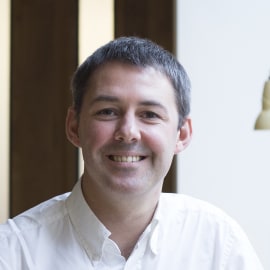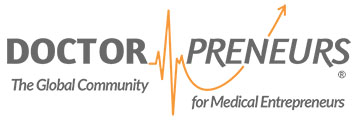 Dr Jamie Wilson is a former NHS psychiatrist, specialised in dementia, and founder of HomeTouch. HomeTouch is an online platform for finding experienced care professionals.
Dr Jamie Wilson is a former NHS psychiatrist, specialised in dementia, and founder of HomeTouch. HomeTouch is an online platform for finding experienced care professionals.
Doctorpreneurs interviewed Jamie when he was setting out in 2016.
In 2017, HomeTouch acquired a large database of 30,000 live-in carers. Overnight, the company became a nationwide provider of care for the ‘live-in care’ segment of the market. ‘Live-in care’ is when the carer lives in the patient’s home on a semi-permanent basis, an alternative to a care home.
Now, HomeTouch self-describes as a dementia care-focused, regulated business serving the most complex, high-margin end of the market. In 2018, HomeTouch’s revenue was £3.5M and they provided 40,000 hours of care, monthly.
Can you give us an update on how things have changed with HomeTouch since our last interview?
In 2017, a challenge was scaling across the country because you’d have to have carers that lived very nearby to the clients’ homes. It was difficult to onboard carers and scale operations. The acquisition of the dementia carer database enabled us to capitalise on the ‘live-in care’ opportunity.
Since, we have increasingly focused on Dementia Care as our core expertise. We observed a couple of things in the market:
- Quality of dementia care was very poor – it’s often the most challenging type of care to provide.
There are other platforms that say “we are all things all men”. But we decided to focus on the dementia need. This allowed us to position ourselves in the ecosystem so that we became well-known for one thing. This also leveraged my professional background and expertise, and enabled us to build partnerships with memory clinics, the Alzheimer’s Society and so on. Our proposition became very clear.
- There was a debate around “is regulation right?”
Obviously, the more complex the care becomes, the more oversight and accountability are needed. HomeTouch became regulated in February 2018. This was an important step for us. We essentially developed our technology to meet those regulatory requirements.
What was the rationale behind becoming a licensed care provider?
CQC is regulating this market and have a huge remit. Regulation is quite onerous and it’s a lot of work. But looking at it positively, it does help you to become better, safer platform.
We have some competitors that are choosing not to regulate. We think that’s a mistake because in this particular market, we have something called a “dual model” consisting of Regulated and Introductory care models.
The Introductory service – which is what we offered from the beginning – is where you match the carer with a client. This works quite well for less complex requirements. For example, for companionship needs and more basic skills. But if you have someone who has much more complex needs whether that’s medication needs or particularly complex elements of care, then there needs to be more oversight and monitoring – this is what we offer with a Regulated model.
People like our Introductory model because they have the choice and control of the carer they choose, but we also have the Regulated model that’s more closely monitored. They are different use cases but it’s important that both are covered.
CQC is regulating this market and have a huge remit. Regulation is quite onerous and it’s a lot of work. But looking at it positively, it does help you to become better, safer platform.
HomeTouch is moving away from a simpler model of enabling patients’ families to search for carers and now offering a more complex care service. What drove you to make this transition?
We’ve moved to what I call a “Full-stack” business model where we are less transactional, and we are managing the whole process for the carers and patients.
If you look at Uber or Airbnb model of on-demand, gig economy, they work where you have a one-off transaction where you might use it once a week or once a year.
But the reality of our model is that there are more ‘on-going’ relationships. The needs change overtime and there are different requirements at different stages of our customer journey.
At the start of the patient journey, a patient’s needs may be, “I want to choose a particular carer” – so we give customers visibility. We have a sales team to help the client-carer matching, using an algorithm and we facilitate a face-to-face or conference-based interview. Then we need to monitor the care delivery, so we have an account manager for each client. The carers are inputting into our care journal, which is monitored by our governance and any concerns are flagged-up.
You can see how it’s more of an end-to-end service, and that’s how to become a better business, I think. If it was simply a case of being a transactional market place, then you are essentially facilitating arrangement between two parties. You have no oversight or visibility of what’s going on when that personal care is being provided. So that’s how we’ve evolved things. We are certainly doing more complex care but we’ve definitely tried to move away from a transactional service type of a business model.
You can see how it’s more of an end-to-end service and that’s how to become a better business, I think.
You mentioned there are competitors in the US and UK in our previous interview. How do you differentiate your company from your competitors?
There are non-regulated competitors that are operating on a basic companionship model or are providing non-technology enabled care. We focus on efficiency and what technology can develop.
When we started out, there were many companies that were making noise for sure. We quickly realised that ‘live-in care’ was the way to go and focused on this area. If anyone is going into a busy market, the key things is to reflect on what your key strengths are. We had the technology, clinical credibility, and the focus on being a clinical-grade specialist care provider rather than being an “Uber for care” – I don’t think it’s possible in this industry.
If anyone is going into a busy market, the key things is to reflect on what your key strengths are.
And what are the main pain points you face now?
It’s a constant battle to retain your vision and to keep pushing forward. There are different challenges at different points of development. Funding is always a challenge. There’s a challenge around: hiring the right clinical people; getting the culture right; dealing with investors; and dealing with the board.
One of the nice things is that I’m now handing over the CEO role to someone who has been a friend and an investor from the beginning. I’ll now focus on the clinical side of the business as I’ve been strained by doing too many roles in the company. I think’s it’s a natural evolution of the company.
What are your clinical involvements within and outside of your company?
Outside of my business, clinical work is mainly advisory, but I still have my license and carry out dementia, mental capacity and mental health assessments. There’s so much within the company that has to be done on the clinical and regulatory side which is also a considerable commitment
One of the challenges as an entrepreneur is to find what your strengths are. The skills required to go from zero to a few million in revenue and to find product/market fits.
We’ve found this now with our dementia focus and the channel focus we have – this has taken a long time. One of the key skills is recognising when you are out of your sphere of competence. My sphere of competence is in dementia and knowing about regulations. I have three or four areas I focus on in my business but having someone who can manage the day-to-day commercial side of the business is a good thing. The person that we’ve brought in definitely has those skills. IT’s about where your skills lie and hiring people to fill these gaps if you are not an outperforming performer on that function. I think that’s really important.
One of the key skills is recognising when you are out of your sphere of competence
What have you enjoyed the most about having your own business?
What I really enjoyed is having customers who are happy and experience the “wow factor”. That’s when you know you are touching on the unmet needs in the market and that it is coming together to address that problem. No entrepreneur will say things happen overnight – they don’t. Things take a long time to bring things together, especially in healthcare where things are complex.
What are your personal and business goals now?
When you are an entrepreneur, it can be quite a lonely experience. You are responsible for many stakeholders, employers, board members, and shareholders. But now I think I’m becoming more of a shareholder than a sole person driving the business forward. What this means is I’m starting to look at what will I do in the future? I’m not ready to move on but I’m thinking: “What is next?”
I now have a young son. I’ve come to the realisation that I don’t want to take the business from zero to 100 million. That would be gruelling, especially in the UK, where it’s actually very tough unless you have amazing investors who back you to the hilt. I think the difficulty in digital health is that we are one of the more successful companies but it’s difficult to grow sales. Care is one of the areas you can do that in but it is pretty challenging because of so many bottlenecks.
What are the main bottlenecks that medic entrepreneurs might experience?
There are more ideas than there are business models. There are many smart people who are thinking about how to digitise the needs in healthcare but actually, investors are not going to put money into just an innovation. They are interested in a sustainable business model that can generate return and that’s important. A lot of clinicians struggle at that stage because they talk different language to the investors, so that’s one bottle neck.
Beginning to commercialise requires different skills because you have to hire people, build a business to have a couple of million-a-year revenue. Many entrepreneurs don’t make that because they don’t have the commercial expertise or they haven’t been able to give away control to someone else. So lack of knowledge is another bottleneck, but if you manage to get beyond that point, you can raise money from your angels.
What I’ve found difficult is what’s called a “Series A” threshold where you get professional financial investors who are dealing with hundreds of deals and trying to filter through them and looking at things in a cold-hearted way because those are the guys who are putting in the big money. That’s difficult for any entrepreneur. We (clinicians) speak a different language. The process is non-sentimental, and numbers have to be robust. It’s a lot of work to get to that stage.
The reality is all big companies that have existed in the technology space have raised decent capital. In the US, it’s not necessarily easier to raise money but they’ll write a big cheque and you are responsible to grow your business like crazy. If you fail you fail. In the UK it’s much more controlled and it’s quite a painful experience. So that’s a big challenge.
We (clinicians) speak a different language.
How have your international experience and MBA helped your journey?
I’ve worked overseas and grew up part in Singapore, worked in Australia. I have these international experiences to call upon, but it’s just another experience at the end of the day. Becoming an entrepreneur is about resilience and persistence and tenacity. We’ve raised money from international investors though. The reality is you have to look internationally if you are doing innovative work because you won’t find everything in one location.
MBA for me was a couple of years for me to reflect on myself. I had a great time at LBS and Berkeley. I enjoyed medical school but the calibre of people at those institutions was very high, so I had a great experience. I am getting onto 10 years out, and I do think it was a great thing to do. In the grand scheme of things, you make up the cost, but I wouldn’t force anyone to do it. There are so many other ways to learn. One important thing is that you have to be committed to life-long learning and that’s true whatever you do. Constantly renewing your knowledge and expanding your network is important. What lasts from an MBA is the network aspects.
MBA also gave me tools for structural and strategic thinking. It was useful because my business approach has been to focus on strategic growth and not on fast growth or raising as much money as possible, which is the culture in the start-up space. Some investors will give you that money with terrible terms, but your risk of burnout is quite high. I’m thoughtful about what are the assets I need to build a sustainable business model.
Being able to story-tell is also very important. People are drawn by stories and you need to be able to tell what you are doing and what the vision of your company is. It’s a hindrance if you don’t have that.
The reality is you have to look internationally if you are doing innovative work because you won’t find everything in one location.
How should medical students approach getting an internship in digital health?
If you are interested in doing an internship, I’d think about “what value can I add?”. I occasionally get “can I come and work one day a week?”. Well, by the time we’ve trained you up that’s difficult to have a value-exchange there. So there needs to be a clear value exchange, but it can often be a great experience. We’ve had a few junior doctors and medical students who have worked with us, and they’ve really enjoyed it because it’s a very different environment.
There are many companies in the digital sphere so with the right kind of proposition, many of them would be happy to have you involved in their projects. There are so many conferences that you can tap into as well. Med school can be a good time as you are seeing patients, going from place to place, soaking up new knowledge. Once you hit a house job, there are great demands and there can be a lot of emotion challenges.
If you are interested in doing an internship, I’d think about “what value can I add?
Finally, do you have any advice for doctors or medical students aspiring to start their own business?
Realise that entrepreneurship is a journey. It’s seen as a glamourous thing but it’s not. You have to make the right choice for your personality. Is it that you want to change something clinically? Do you like the commercial aspects? Do you want freedom and independence?
You need to be careful what you optimise for. It can give you more freedom but what they say is, “your relationship with your investor lasts longer than your average marriage”. To some extent you become wedded to your business. I’ve had somewhat a less flexible lifestyle in the last few years than I did previously. So, understanding your motives is key.
The other advice is do not rush into things. Really spend the time to work out the commercial model for what you are trying to do. There are so many doctors who have good ideas, but they just haven’t had the exposure to how you scale up things. Also, you have to have something that adds something clinically but something that adds commercial value as well. Because without that model, you won’t’ get it off the ground.
Realise that entrepreneurship is a journey. It’s seen as a glamourous thing but it’s not.

